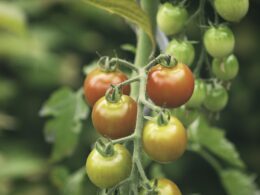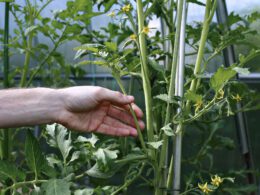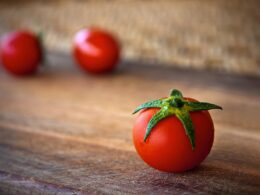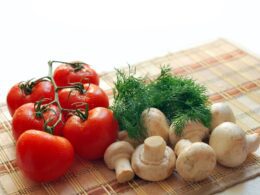You’ve just discovered a carton of old eggs hiding in the back of your fridge, and you’re faced with the dilemma: to throw them away or not? Before you toss them in the trash, consider this – those old eggs might just be a valuable addition to your garden.
It’s true! In fact, many gardeners swear by using expired eggs as an effective and environmentally friendly way to nourish their plants.
But before you go cracking those shells into your flower beds, it’s essential to know how to safely use old eggs in your garden without posing any risks. This article will guide you through the benefits of repurposing expired eggs for your plants, how to properly incorporate them into your gardening routine, potential risks and precautions involved, and other sustainable gardening practices that can help create a healthier environment for both you and your green friends.
So let’s work towards reducing food waste together while giving our gardens a boost they deserve!
The Benefits of Old Eggs in Your Garden
Ever thought about tossing those expired eggs into your garden? Well, it turns out they’re actually quite beneficial! Not only do old eggs provide essential nutrients for your plants, but they also act as a natural pest deterrent.
So next time you find yourself with a carton of expired eggs, don’t just toss them in the trash – give your garden a little boost instead. Using old eggs in your garden is an easy and inexpensive way to improve the health of your plants.
The shells are rich in calcium, which helps strengthen cell walls and promotes overall plant growth. Plus, when you crush up the shells and mix them into the soil, they create tiny air pockets that improve drainage and allow roots to breathe more easily.
But that’s not all – using old eggs can also help keep pesky critters like slugs and snails at bay because their soft bodies can’t handle crawling over the sharp edges of crushed eggshells. So go ahead and crack open those old eggs directly onto the soil or mix crushed shells into your compost pile – either way, you’ll be giving your garden a nutrient-rich treat that will help it flourish while keeping pests away.
Your plants will thank you for it, and you’ll have peace of mind knowing that you’re creating a safer environment for both them and yourself by repurposing something that would have otherwise gone to waste.
How to Safely Use Old Eggs in Your Garden
Incorporating aged eggs into your garden can be done safely by following some simple guidelines. Using old eggs in your garden can provide a variety of benefits, but it’s essential to ensure that you’re not creating any health risks or attracting unwanted pests.
By taking the proper precautions and preparing the eggs correctly, you can enjoy a more fruitful and vibrant garden without worry. Here’s how:
- Crack open the eggshells and remove any remaining egg whites or yolks.
- Rinse the shells thoroughly with water to remove any residue.
- Crush the shells into small pieces for easier decomposition.
By following these steps, you’ll not only prevent bad smells from developing but also make it less likely that rodents or other pests will be attracted to your garden because of the old eggs. Additionally, crushing the shells allows for quicker decomposition, which helps release valuable nutrients like calcium back into your soil more rapidly.
It’s important to remember that moderation is key when using old eggs in your garden – don’t overdo it! Too many crushed eggshells can cause an imbalance in soil pH levels and may harm some plants. Make sure to spread them out evenly among different areas of your garden so they have time to break down properly without overwhelming any one spot.
By doing this, you’ll create a safe environment for both yourself and your plants while still reaping all of the benefits that come with incorporating aged eggs into your gardening routine.
Potential Risks and Precautions
Before diving into the potential risks and precautions of using old eggs in your garden, it’s crucial to consider a few key points. Avoiding contamination from salmonella and properly disposing of rotten eggs are important factors to keep in mind. By taking these factors into account, you’ll be able to make informed decisions on how to safely use old eggs for gardening purposes while keeping yourself and your plants healthy.
So let’s delve deeper into these essential aspects to ensure a successful gardening experience.
Avoiding Contamination from Salmonella
To dodge any risk of Salmonella contamination, it’s essential to take certain precautions when adding aged eggs to those lovely garden beds.
First and foremost, make sure you’re cracking open the eggshells before burying them in the soil. This simple step allows the nutrients inside to be released more quickly while also reducing the chances of bacteria growth.
Another tip is to avoid placing your old eggs near edible plants or root vegetables, as this can increase the likelihood of contamination. Instead, try using them around ornamental plants or flowers that won’t end up on your dinner table.
By following these easy steps, you’ll not only keep your garden safe but also give it a nutrient boost without any worry!
Properly Disposing of Rotten Eggs
When dealing with rotten eggs, it’s crucial to dispose of them correctly in order to maintain a healthy and thriving garden. If not handled properly, these eggs can attract pests and emit foul odors that will make your outdoor space unpleasant for both you and your plants.
So, let’s talk about the right way to get rid of those stinky rotten eggs. First things first: wear gloves! You don’t want any nasty bacteria or smells lingering on your hands after handling rotten eggs.
Next, place the egg(s) in a sealed plastic bag or container – this will help contain the odor and minimize potential messes. Once they’re securely enclosed, toss the bag in your outdoor garbage bin (not your compost).
Make sure to wash your hands thoroughly afterward, even if you wore gloves because safety is key when dealing with potential contaminants like rotten eggs. By following these simple steps, you’ll keep both yourself and your garden safe from harm while efficiently disposing of those unwanted surprises!
Other Sustainable Gardening Practices
Ready to level up your sustainable gardening game? Start by composting kitchen scraps, turning waste into nutrient-rich soil for your plants.
Don’t forget to save those coffee grounds and tea leaves, as they make excellent additions to your garden. They provide essential nutrients and improve soil structure.
Composting Kitchen Scraps
Don’t let those kitchen scraps go to waste – composting them can do wonders for your garden! Composting is an excellent way to recycle organic materials, improve soil health, and reduce landfill waste.
By incorporating a variety of kitchen scraps into your compost heap, you’ll be providing essential nutrients that promote plant growth and a thriving ecosystem in your garden. Here are some types of kitchen scraps that are perfect for composting:
-
Fruit and vegetable peels, cores, and rinds. These add carbon-rich elements to your compost pile. They break down quickly and provide vital nutrients like potassium, phosphorus, and nitrogen.
-
Coffee grounds and tea leaves. They contain nitrogen which helps break down other organic materials in the compost pile. Adding these can also help balance the pH levels in acidic soils.
-
Crushed eggshells. They provide calcium to support strong cell walls in plants. Eggshells can also help deter pests like slugs and snails.
Remember to maintain a balanced mix of green (nitrogen-rich) materials like fruit peels and coffee grounds with brown (carbon-rich) materials like dried leaves or cardboard. This ensures efficient decomposition while also keeping odors at bay.
A well-maintained compost pile will create nutrient-dense humus that enriches your garden’s soil structure – leading to healthier plants, more robust blooms, higher crop yields, and ultimately creating a safer environment for you and your family.
So embrace this sustainable gardening practice by starting your own backyard compost pile with those leftover kitchen scraps!
Utilizing Coffee Grounds and Tea Leaves
Incorporating coffee grounds and tea leaves into your composting routine offers a range of benefits that’ll greatly enhance the health and vibrancy of your plants. These organic materials are rich in nutrients, such as nitrogen and phosphorus, which promote strong root growth and improve soil structure. Plus, they’re readily available from your daily cuppa, making it easy to add them to your kitchen scrap compost pile without having to go out of your way.
As an added bonus, using coffee grounds and tea leaves in your garden can help keep pests at bay. The natural compounds found in these materials may deter bugs like slugs and snails from feasting on your precious plants. So not only will you be giving new life to used-up kitchen waste, but you’ll also be creating a safer environment for your plant babies to thrive in.
That’s definitely something worth raising a mug (or teacup) to!
Can Old Eggs Also Be Used as Fertilizer in Your Garden?
Yes, old eggs can be used as fertilizer in your garden. Crush the eggshells and sprinkle them in your garden to add calcium and other minerals to the soil. Additionally, you can also sprinkle coffee grounds in the garden to enrich the soil and deter pests.
The Bigger Picture: Reducing Food Waste
Now, let’s dive into the bigger picture: reducing food waste. We’ll share some tips on properly storing eggs and planning meals to minimize waste. By following these guidelines, you’ll be doing your part in creating a more sustainable world.
Adjust the paragraph structure in the Input to logically group complete sentences on their own lines, with a double new line after. Use contractions.
Tips for Properly Storing Eggs
To ensure your eggs stay fresh and safe to eat, it’s essential to store them correctly. First things first, always keep your eggs in the refrigerator.
The ideal temperature for storing eggs is between 33°F and 40°F (1°C and 4°C). Storing them in a consistent, cool environment will prevent the growth of harmful bacteria and reduce the chances of spoilage. Additionally, try to place your eggs on an inner shelf rather than on the door, as this provides a more stable temperature.
When handling your eggs, be gentle and avoid cracking their shells. Cracked shells can allow bacteria to enter, posing a risk to your health when you eventually consume them.
Keep your eggs in their original carton, as it helps protect them from damage while also making it easier for you to check expiration dates. By taking these simple precautions when storing your precious cargo of protein-packed goodness, you’ll not only ensure that they’re safe for consumption but also help reduce food waste one egg at a time!
Planning Meals to Minimize Waste
Let’s dive into planning meals efficiently to minimize waste and get the most out of those protein-packed gems! Planning your meals in advance not only helps reduce food waste but also ensures you have a delicious and nutritious menu lined up.
Start by taking inventory of what you already have in your fridge, freezer, and pantry – especially focusing on perishable items. Next, brainstorm meal ideas that incorporate these ingredients along with your fresh eggs.
When creating your meal plan, consider batch cooking or meal prepping to extend the life of your eggs and other perishables. This way, you can enjoy multiple dishes throughout the week without worrying about spoilage or wasting any food.
Don’t forget to store leftovers properly to maintain their freshness for as long as possible! By following these simple steps, you’ll be able to savor every last bite while keeping your kitchen eco-friendly and safe for everyone who enters it.
Conclusion
So, you can definitely put old eggs in your garden! They’re a great source of nutrients and help improve soil quality. Just make sure to follow the right steps to avoid any potential risks.
By incorporating old eggs and other sustainable gardening practices, you’ll not only have a thriving garden but also contribute to reducing food waste. It’s a win-win situation for both your plants and the environment!









